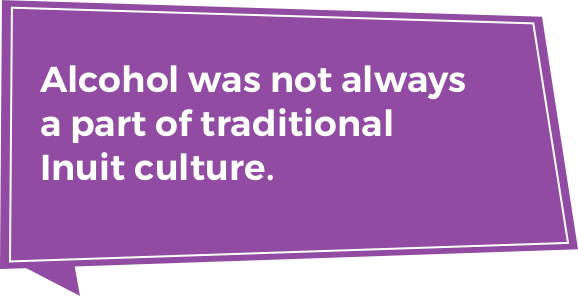Alcohol use in Nunavut

Alcohol was not always a part of traditional Inuit culture. In fact, many Inuit were only introduced to alcohol when they were moved into settlements.
This transition from a traditional way of life to a modern society has had major impacts on the health and well-being of individuals and families, with increases in:
- poverty
- poor nutrition
- lower education levels
- unemployment
- poor housing conditions and overcrowding
- family conflict, violence and abuse
- individual and community trauma
As Inuit tried to deal with the trauma of changes to their traditions and lifestyles, some people turned to alcohol to help them cope and manage stress. For some people, alcohol is used to cope with traumatic experiences, grief, anger, violence and abuse. Alcohol combined with these experiences can make it hard to function and make life situations much more difficult.

Today, heavy alcohol use is common in many Nunavut communities, with often devastating impacts on individuals, families and communities. These include injuries from accidents and violence, depression and suicide, family conflict, sexual abuse, poor pregnancy outcomes and fetal alcohol spectrum disorder (FASD).
While there are many reasons why people use alcohol to cope, it is often a way to mask existing pain. It is important to understand why some Nunavummiut use alcohol in harmful ways, but it is also important not to judge those struggling with alcohol, and to recognize how past experiences have shaped their lives.
Heavy alcohol use affects everyone, and Nunavummiut want to take action to reduce the harm caused by alcohol. Government, Municipalities, Inuit organizations, Alcohol Education Committees and other community partners are working together to encourage responsible and safer choices about alcohol use to reduce the harm and protect the health, safety and quality of life for everyone.
